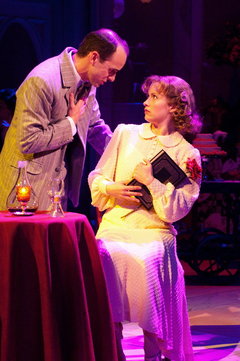It’s become chic in literary circles to celebrate June 16 as Bloomsday, the date on which the events chronicled in James Joyce’s Ulysses supposedly took place in Dublin. But celebrations notwithstanding, the fact remains that Ulysses is more admired than read–and that Finnegans Wake, Joyce’s other major novel, isn’t even read. Few people are prepared to grapple with its fantastic verbal complications, any more than they’re prepared to grapple with the musical hypercomplexities of an exercise in atonal modernism like Pierre Boulez’s Le marteau sans maître.
 I thought of Joyce at once when a musician friend drew my attention the other day to a 1988 paper by Fred Lerdahl called Cognitive Constraints on Compositional Systems. Lerdahl, a tonal composer who has studied cognitive psychology, believes that certain kinds of modern music are too complicated for the human brain to process, and will therefore never find an audience. It immediately occurred to me when I read his paper that the same inborn limitations on intelligibility might apply to practitioners of other art forms–and no sooner did I come to that conclusion than I felt the first stirrings of a “Sightings” column for The Wall Street Journal.
I thought of Joyce at once when a musician friend drew my attention the other day to a 1988 paper by Fred Lerdahl called Cognitive Constraints on Compositional Systems. Lerdahl, a tonal composer who has studied cognitive psychology, believes that certain kinds of modern music are too complicated for the human brain to process, and will therefore never find an audience. It immediately occurred to me when I read his paper that the same inborn limitations on intelligibility might apply to practitioners of other art forms–and no sooner did I come to that conclusion than I felt the first stirrings of a “Sightings” column for The Wall Street Journal.
Are our brains simply not big enough to process the prose of Joyce or the music of Boulez? And if not, then why have such similarly complex artistic creations as the drip paintings of Jackson Pollock succeeded in finding an appreciative popular audience? To find out, pick up a copy of Saturday’s Journal and see what I have to say.
UPDATE: Read the whole thing here.
* * *
James Joyce reads an excerpt from Finnegans Wake:
Archives for June 25, 2010
TT: In love with She Loves Me
In today’s Wall Street Journal drama column I report on two more shows from the Oregon Shakespeare Festival, She Loves Me and The Merchant of Venice. I was thrilled by one but didn’t warm up to the other. Here’s an excerpt.
* * *
 For a cult show, “She Loves Me” sure gets done a lot. I know of two revivals taking place this year, one which closed last month at Connecticut’s Westport Country Playhouse and another that runs through October at the Oregon Shakespeare Festival, and I expect there are others of which I haven’t heard. I trust they’re all worthy, but the OSF production of “She Loves Me,” directed by Rebecca Taichman, is special in every way, a near-flawless realization of one of the most delightful musicals of the 20th century.
For a cult show, “She Loves Me” sure gets done a lot. I know of two revivals taking place this year, one which closed last month at Connecticut’s Westport Country Playhouse and another that runs through October at the Oregon Shakespeare Festival, and I expect there are others of which I haven’t heard. I trust they’re all worthy, but the OSF production of “She Loves Me,” directed by Rebecca Taichman, is special in every way, a near-flawless realization of one of the most delightful musicals of the 20th century.
First seen on Broadway in 1963, “She Loves Me” is based on “The Shop Around the Corner,” Ernst Lubitsch’s 1940 screen version of “Parfumerie,” a Miklós Laszló stage comedy that was later filmed as “In the Good Old Summertime” and “You’ve Got Mail.” The setting is prewar Budapest and the plot is a clockwork farce: Amalia and Georg, two love-starved members of what used to be called a “lonelyhearts club,” are sending each another anonymous mash notes without ever having met….
The word “endearing” can sound saccharine, but it fits “She Loves Me” as tightly as the skin on an apple, and one reason why this revival is so easy to love is the way in which it is cast. Instead of picking a pair of pretty-pretty stars, Ms. Taichman has gone in a different direction: Georg is played by Mark Bedard, who is balding, bespectacled and sharp-faced, while Lisa McCormick, who plays Amalia, is an eagerly fluttering sparrow who is charming but not glamorous. You don’t have to strain to see the two of them as a pair of wallflowers who make each other blossom….
Ms. Taichman is best known to New York theatergoers for her staging of the 2007 Off Broadway premiere of Theresa Rebeck’s “The Scene.” I had no idea that she would be similarly adept in musical comedy, but her collaboration with choreographer John Carrafa (who staged the musical numbers for the original production of “Urinetown”) is seamless and scintillating. Songs and dialogue are woven together indissolubly, and each scene is played not for laughs but for truth–which means that the laughter comes from the heart….
Everybody wants to do “The Merchant of Venice,” but few directors are prepared to grapple forthrightly with the play’s gnarly side. The Oregon Shakespeare Festival’s new production, staged by Bill Rauch and performed in the company’s Elizabethan-style outdoor theater, leaves nothing to be desired in this respect: It abounds with racial stereotypes, all of which are presented unapologetically. The staging is full of sharp comic twists, and one of the performances, that of Anthony Heald as Shylock, is impressively pointed and lively. Yet the divine spark is missing…
* * *
Read the whole thing here.
TT: Almanac
“Almost every wise saying has an opposite one, no less wise, to balance it.”
George Santayana, “Reason in Ethics”
